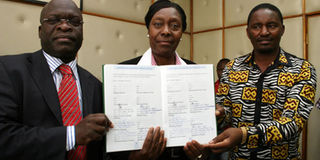Kenya signs Nile Basin pact

Water and Irrigation minister Charity Ngilu (centre), assistant minister Mwangi Kiunjuri (right) and Permanent Secretary David Stower (left) display the signed Nile Basin Cooperative Framework Agreement at Afya House, Nairobi May 19, 2010. Photo/LIZ MUTHONI
What you need to know:
- Kenya says treaty will enhance equitable utilisation of resources and boost development for its population.
Only one more country needs to sign on a plan to liberalise the utilisation of the resources of River Nile to open it for implementation.
This follows Kenya’s signing on the Cooperative Framework Agreement Wednesday to become the fifth country out of nine members to do so.
Water and Irrigation minister Charity Ngilu Wednesday signed the Agreement, which has been rejected by Egypt and Sudan, on behalf of the government.
Ethiopia, Uganda, Tanzania and Rwanda had appended their signatures on May 14 in Entebbe when it was first opened for signatures. The document will remain open for signature for a period of one year until May 13, 2011.
Kenya was represented at the Entebbe meeting by its high commissioner to Kampala Geoffrey Okanga who could not sign.
The ceremony at the Water Ministry headquarters was witnessed by the executive director of the Nile Basin Initiative Henriette Ndombe and several top ministry officials.
During the signing ceremony, Ms Ngilu dismissed threats by Egypt to talk donors out of financing projects along the river Nile.
“It has been a long journey,” she said.
“The Nile Basin negotiations began over 10 years ago with a view to coming up with a new Nile Basin draft agreement, which would offer equal opportunity for equitable and reasonable access to water resources of the River Nile.”
Egypt, which is almost entirely dependent on the waters of the Nile, has warned that the new agreement lacks legitimacy saying it "reflects only the views of the seven states".
Negotiations on the agreement started in 1997 but have been held back by the Egypt and Sudan who object to Article 14 (b) which they claim takes away their historical rights and uses of the River Nile waters.
The article states: "Nile Basin States, agree, in a spirit of cooperation, to work together to ensure that all states achieve and sustain water security and not to significantly affect the water security of any other Nile Basin State."
Egypt and Sudan want the last part of the article re-phrased to read, "Not to adversely affect the water security and current uses and rights of any other Nile Basin States."
With hopes of more talks with upstream states dwindling, Egypt is understood to be approaching development partners from China to various European and Arab countries in a bid to block them from financing projects such as dams and hydro-power projects.
Mrs Ngilu dismissed those attempts and said Kenya had engaged all the stakeholders and found the CFA to be suitable in the management of the common Nile resources.
“Nothing now stops us from using the waters as we wish. It is now up to Egypt and Sudan to come on board in the spirit of cooperation on the basis of One Nile, One Basin and One Vision,” she added.
“Two states out of nine cannot stop us from implementing this framework.”
At the last round of negotiations held in April 2010, Egypt and Sudan had introduced a new proposal seeking to establish the Commission before concluding negotiations on the Agreement, in a move upstream states described as putting the cart before the horse.
In the proposal, the downstream states wanted all the Nile Basin countries to issue a presidential declaration to launch the Commission as negotiations to reach a comprehensive agreement continue.
With Kenya’s signature in the bag, the upstream states now wait for one more country – DR Congo and Burundi in that order - before the treaty is ratified and deposited with the African Union and the UN.
Thereafter, the riparian states will go ahead with the establishment of the long-awaited Commission to manage the resources of Africa’s longest river.
The Commission will replace the legally fragile Nile Basin Initiative which has been in existence since 1995 but whose relevance and bargaining power with donors has been quickly waning.
Despite Egypt and Sudan contributing little to the flow of River Nile, a colonial agreement signed with the British in 1929, made the two the biggest beneficiaries in terms of exploiting the river's resources for development.
The treaty also gave Egypt rights to veto upstream projects.
Kenya contributes up to 40 per cent of water to Lake Victoria through direct rainfall which later exits as the White Nile.
Another 40 per cent enters the lake from Tanzania, Rwanda and Burundi through River Kagera while the rest comes from Uganda as a result of direct rainfall.
But in terms of usage, Egypt and Sudan consume 56 billion cubic metres and 18.4 billion cubic metres respectively out of the 90 billion cubic metres that flow through the Nile annually.
Mrs Ngilu noted that the signing of the treaty will enhance equitable utilisation of resources and boost development for their populations.
Besides, she added, donors who have found it difficult to sign agreements with NBI which operates with weak legal backing will find it much easier to work with the Commission.
“Some financiers have been turning us away because of lack of a legal framework which the Commission now has,” she said.




